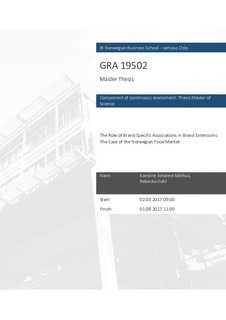The role of brand specific associations in brand extensions : the case of the Norwegian food market
Master thesis
Permanent lenke
http://hdl.handle.net/11250/2482899Utgivelsesdato
2017Metadata
Vis full innførselSamlinger
- Master of Science [1622]
Sammendrag
Brand specific associations is confirmed to be an important driver for fit in brand
extension strategy. Extended consumer packaged goods that include the same brand
specific associations as the parent brand are more likely to succeed, and will thus
enhance the equity of the parent brand. Previous research in the field of brand
specific associations, consumer packaged goods, and brand extensions have
however, never made a clear distinction between success criteria for extensions of
edible and inedible goods. As consumer packaged goods consumption for edible
and inedible goods differ in several ways, we believe it would be valuable for
managers to know if they should include different brand specific associations for
different product categories when extending. The purpose of this thesis is therefore
to advance previous research on brand specific association effects, and hopefully
enable managers to introduce extensions with greater chances of success.
Two pretests were carried out to find suitable brands and related brand specific
associations, in order to create hypothetical brand extensions. The brands chosen
were Jarlsberg and Jif, respectively an edible and an inedible product, which are
two high equity brands on the Norwegian market. A questionnaire used in the online
survey, constructed by pre-established scales from existing literature, was
distributed through social media to obtain data. In the main study, fit between the
parent brand and the extensions was manipulated to see how using brand specific
associations in terms of different sensory attributes for different product categories
impact brand extension responses. Three types of brand responses were evaluated:
over all brand extension attitude, purchase intention and willingness to recommend.
The findings confirmed our hypotheses, that including brand specific associations
in terms of a chemical sensory attribute enhances extension responses for edible
goods. The findings also confirmed our assumption that including associations in
terms of a visual sensory attribute enhances extension responses for inedible goods.
The effect was, however, strongest for edible goods, and the overall effect was
strongest for attitude across all conditions tested. Managers should thus be aware
of what kind of brand specific association they transmit to an extension
to optimize extension responses.
Beskrivelse
Masteroppgave(MSc) in Master of Science in Strategic Marketing Management - Handelshøyskolen BI, 2017
